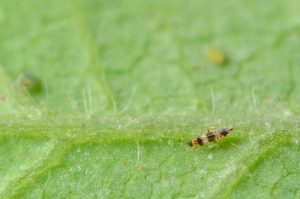 Controlling insect behavior might lead to better pest management for growers in the Southeast.
Controlling insect behavior might lead to better pest management for growers in the Southeast.
Xavier Martini, assistant professor at the University of Florida Institute of Food and Agricultural Sciences North Florida Research and Education Center in Quincy, studies insect behavior to help growers control pests.
One part of his research uses natural enemies to combat major pests in the field. Thrips, for example, is an issue he works on closely. He is currently studying minute pirate bugs, small insect predators that consume thrips.
Thrips affect many common crops grown in the Southeast, such as tomatoes, peppers and strawberries.
In order to control insect behavior, researchers are studying possible attractants for natural enemies. Martini said it is important to understand how the insects interact in the field to learn how to best control them.
Research is still in progress, but a post-lab project plan includes a device that will release an attractant chemical and bring more natural enemies into the field.
Martini said he is learning about the different aspects that attract the minute pirate bug to increase its presence in the field. “We want to work with the natural enemies and want to see if we can attract natural enemies directly where they are needed to increase better control,” he said.
Another branch of the project is to manipulate the behavior of the pest to make it easier for the grower to apply repellants. If growers know where and how a pest typically behaves, defending the crop against the pest becomes an easier task.
Trials of this repellant application have been successful in decreasing pests. Therefore, growers can benefit from learning more about interactions of insects and manipulating pests in their fields.
Share this Post









